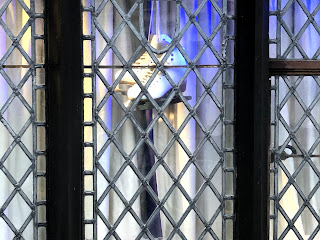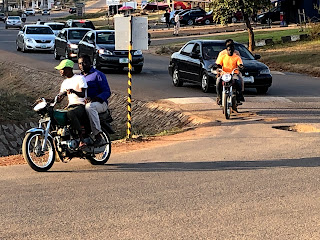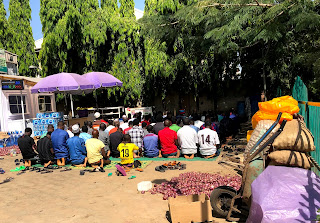We start our day getting the turkey into the oven, trussed and stuffed. Fortunately we no longer attempt to do this at 6 am; health and safety no longer approves of those long roast times at low temperatures. I cannot talk my family out of stuffing the bird, so the chestnut mixture goes in and my mother goes in search of her thimble. This particular bird proves a tough one to stitch and we go through 3 needles in the process. One was still unaccounted for when the bird went in the oven, so we might find a sharp surprise when carving! Henry Vlll is credited in starting the tradition of roasting a big bird on Christmas day, although it may have been roast peacock. It has been nothing but turkey ever since. Another food you are sure to find on the Christmas day table is Brussel sprouts. These, along with parsnips, have become such a symbol of Christmas in Britain, that it is hard for me to imagine a seasonal feast without them. I don't know of any other country that embraces these vegetables, many find them unpalatable. No one knows the reason for their introduction, but they do promise to be the one really healthy item on the menu. As all our other favorite side dishes become frozen foods, the Brussel sprouts will always be fresh and green. The most misunderstood Christmas dish is the Christmas pudding, followed closely by the Christmas cake and mincemeat pies. You must understand that the roots of these traditional sweets are actually in medieval sausages. Fat, fruit and spices were used to preserve meat that was stuffed into animal intestines. Later dried fruit was used, leading to the name "plum" pudding, which was served without the sausage casings. The pudding, as well as minced-meat, no longer contains meat, but the spices, fruit and suet remain the same. If you are not British you have either never tasted this seasonal treat, or wondered how it has endured as a favorite. For me it encapsulates the British tradition of Christmas. There is a real need to adhere to something that binds us together and makes us feel British. This doesn't mean that the dishes haven't needed a little embellishing to create the enduring appeal, especially for children. Coins are hidden in the puddings which are soaked in brandy and lit on fire: great PR! And if that isn't enough, the pudding is served smothered in a hot buttery brandy or rum sauce. As a child I was given the nonalcoholic sauce, but, like eggnog, I have graduated to the adult version since. The last clever ploy to give prominence to the 'figgy pudding' is to ensure it doesn't share the limelight with any other Christmas treat. It doesn't have to compete with gingerbread, cookies, or chocolates: there is only one desert choice on the menu Christmas Day. Of course, you realize, Christmas is far from over on December 25th. Boxing Day is another enigma of the British holiday season, because who needs another day of feasting? Well, Christmas is a Church holiday, while Boxing day is the real holiday for all those who spent the last month baking, shopping and preparing. There is no church service, no deadline and no traditional menu. This year COVID has brought back the true meaning of Boxing day by closing stores and stopping shoppers from spending time at the post Christmas sales. We can spend time unboxing our gifts, clearing away the wrapping paper, and eating left overs. It is a true day off, a time to relax with a glass of wine, some Christmas cake and cheese.
Saturday, December 26, 2020
British Christmas Explained
Tuesday, December 22, 2020
The Perfect Christmas Storm
No, we are not preparing for a snow storm, but for Brexit. The UK will sever ties with Europe in, what appears to be, a way that leaves no room for trade deals to be made before January 1st, 2021. What does this mean? Well we are starting to find out, as the COVID virus is giving those of us in the UK over Christmas, a sort of a trial run.
The present government had leaned towards continuing with the opening of businesses, and allowing people to travel for the holidays. Then, in an about turn, Boris Johnson announced a partial closing of all businesses in the southeast and London, and a ban on travel out of the area, for two weeks beginning midnight Saturday, December 19th. Jon and I arrived in London to the news, and we were one of the few who didn't immediately rush out shopping or to train stations and airports.
Christmas had been cancelled. No one was to be traveling to be with loved ones, stores would close, and all gatherings should be avoided. The ripple affect was that 40 countries immediately put into place a travel ban for passengers leaving the UK. That meant that airports and airlines were scrambling to refund, rearrange and answer questions about the millions of travel arrangements made by every passenger hoping to get home for Christmas. We found you could fly into the UK, but then your were marooned, unable to leave. So that affected flights into the country as well. A friend flew Monday through the UK in transit to Ireland. The flight to Dublin was canceled and the airline had to reroute her through Belfast. Not only flights were cancelled, but ferries as well, cutting off that route to Ireland or the continent.France very quickly closed its ports to all trucks trying to cross the channel. That led to long lines of thousands of trucks en route, with nowhere to go. Would that affect the shipping of our favorite holiday treats and produce? Good thing we already bought the turkey! But those trucks were trying to make their last delivery before all trading must stop on January 1st. If a no-deal Brexit comes before the border opens, then those loads will be lost. This led to Scotland's declaring: "The U.K. government has to recognize that we are in the midst of a perfect storm and to risk further disruption and financial damage to businesses in just 10 days’ time is completely unacceptable", and asking for there to be further consideration given to the Brexit deadline. This is already a Brexit that has been delayed since the referendum in 2016, and further delaying the date might be contentious. Can the UK afford to delay even more? Can it afford Brexit at all?Many are blaming the governments slow actions towards both Brexit talks and COVID guidelines. However, the real catalyst to this perfect storm is a new variant of the virus that is 70% more likely to spread than the original strain. This is what is prompting the economic shut down and transport bans. They are attempting to keep the variant from reaching Europe. "Plague Island" has been used to describe the British Isles. They may be too late. This variant has been detected in other countries: Denmark, South Africa and even Australia.
Could all of this been avoided? Could the Brexit deadline have been set for another date? Probably. Could the country have kept stricter COVID guidelines since the first wave of infections? Certainly. Could the European Union be on better terms with the UK? Hard to say. One quote from the NY Times: “Little England has always wanted to cut off the continent, they’ve finally achieved it.” (Powell). But their timing is way off!
Sunday, December 13, 2020
Where's an Uber when you need one?
It is after 6pm, the sun is going down, the bugs are biting, and we are waiting for a driver to come and pick us up. Since moving to Abuja, and after being released from quarantine, Jon and I rely on Uber drivers to take us out and about. There are other transportation options available, but the Uber app is both convenient and familiar. We are able to connect with a driver, give both our location and destination, and make payments, all electronically. This bypasses the problem of using cash and verbally explaining where we want to go. The only problem is... there just aren't that many drivers, and during peak hours, we find ourselves waiting quite a while for a ride home.We could go another route: buy a car or hire a driver. Other teachers find either quite affordable. However, Jon and I tolerate the Ubers, and here is why. In the 20 to 30 minutes that we wait for a driver, we watch a whole new world go by! Every time we go out, that wait time turns me into an observer and opens my eyes to what it means to live in Abuja.
Sunday, December 6, 2020
The Cube Cafe
Our Uber driver pulled up to the closed gates of what appeared to be an abandoned amusement park. We assumed he had the wrong address and asked him to back up past the chickens and overgrown stream bed, to retrace our steps through the upperclass district of Abuja called Maitama. Our destination, the stylish Cube Cafe, must be nearby.
"Nigeria is a nation of people who eat beef and chicken and cow skin and intestines and dried fish in a single bowl of soup, and it is called assorted, and so get over yourselves and realize that the way of life here is just that, assorted." Nigerian author Chimamanda Adichie in her novel, Americanah (2013 Knopf)















